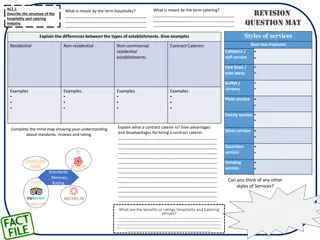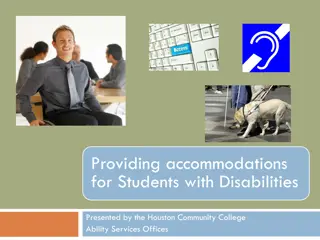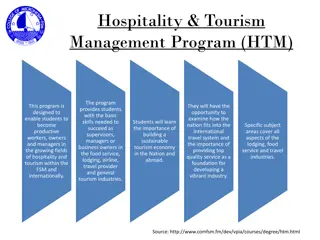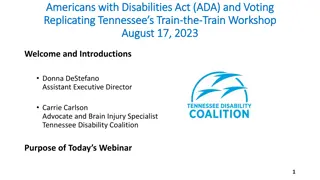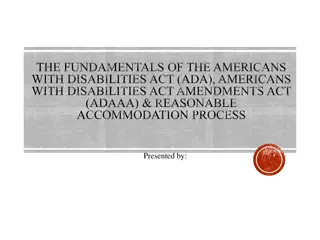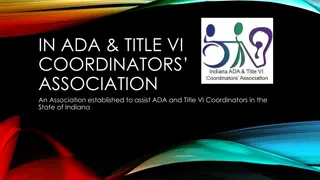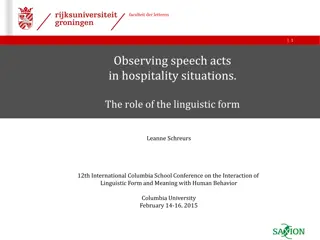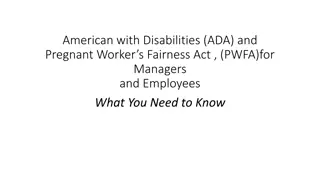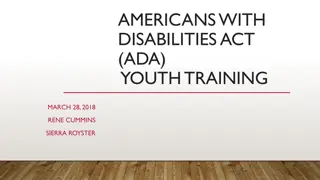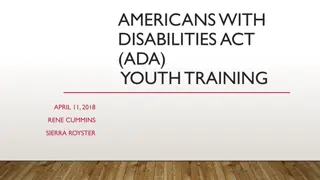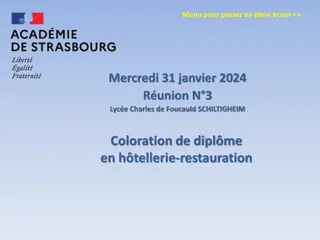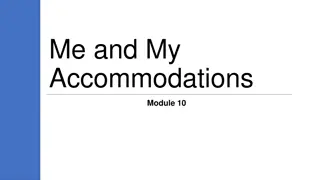Understanding Legal Issues in the Hospitality Industry under the ADA
The 2013 Legal Issues Webinar Series covers the American with Disabilities Act (ADA) regulations and case law relevant to the hospitality industry. It includes topics such as public accommodations, employment, recent case laws, DOJ settlements, EEOC regulations, and more. The materials are property of the Great Lakes ADA Center and permission is required for distribution.
Download Presentation

Please find below an Image/Link to download the presentation.
The content on the website is provided AS IS for your information and personal use only. It may not be sold, licensed, or shared on other websites without obtaining consent from the author. Download presentation by click this link. If you encounter any issues during the download, it is possible that the publisher has removed the file from their server.
E N D
Presentation Transcript
Welcome to the 2013 Legal Issues Webinar Series The content and materials of this training are property of the Great Lakes ADA Center and cannot be distributed without permission. This training is developed under NIDRR grant #H133A110029. For permission to use training content or obtain copies of materials used as part of this program please contact us by email at webinars@ada-audio.org or toll free 877-232- 1990 (V/TTY). 1
The ADA in the Hospitality Setting Presented by: Barry Taylor, VP for Civil Rights and Systemic Litigation, Equip for Equality Rachel Weisberg, Staff Attorney, Equip for Equality May 8, 2013 2
Continuing Legal Education Credit for Illinois Attorneys This session is eligible for 1.5 hours of continuing legal education credit for Illinois attorneys. Illinois attorneys interested in obtaining continuing legal education credit should contact Barry Taylor at: barryt@equipforequality.org This slide will be repeated at the end. 3
Overview The ADA has done much to open the doors to the hospitality industry to people with disabilities Title III: Public accommodations (hotels, restaurants, cruise lines) Customers with disabilities Recent case law DOJ regulations (including new regulations) DOJ settlement agreements and consent agreements Title I: Employment Employees with disabilities Recent case law EEOC regulations and guidance documents 4
Title III Legal Standing Statute of Limitations 2010 Standards for Accessible Guest Rooms at Places of Lodging 2010 Standards for Accessible Pools Barrier Removal in the Hospitality Industry Service Animals Reservations Policies Communication Access Website Access 5
Title III: Background Title III prohibits discrimination by places of public accommodations Public accommodations = 12 enumerated categories Include private entities that operate: inn, hotel, motel, or other place of lodging 42 U.S.C. 12181(7)(A) a restaurant, bar, or other establishment serving food or drink 42 U.S.C. 12181(7)(B) For more information on Title III issues: Great Lakes ADA Center Legal Brief titled, Hot Topics in ADA Title III Litigation www.adagreatlakes.org/Publications/Legal_Briefs/BriefNo011_Title3Litigation.pdf 6
Discrimination, generally United States of America v. Corral of Westland, LLC, ECF No. 2:13-cv-10717 (E.D. Mich.) DOJ lawsuit Children had a genetic disease that caused severe blistering Restaurant manager questioned mother, who said that the children s disease was not contagious Manager denied service to the family and said children s presence made other customers uncomfortable Case settled on April 15, 2013 Details of the settlement are expected soon - www.ada.gov Complaint: www.ada.gov/golden_corral_cmplt.htm 7
Legal Standing Plaintiffs must have standing to bring a lawsuit Three components: Lujan v. Defenders of Wildlife, 504 U.S. 555 (1992) Plaintiff must suffer a personalized and concrete injury-in-fact of a legally cognizable interest Plaintiff s injury must be fairly traceable to defendant s conduct It must be likely, as opposed to speculative, that a favorable court decision will redress plaintiff s injury Many Title III cases rise or fall on the question of standing Plaintiff must show harm/future injury due to ADA violations Plaintiff must show relationship to disability Sometimes used to screen frivolous lawsuits 8
Standing: Harm/Future Injury? Must show harm/future injury is likely Courts consider four factors: the proximity of the business to the plaintiff s home Note that for hotels, the proximity factor is less important. Access 4 All, Inc. v. Wintergreen Commercial Partnership, Ltd.,2005 WL 2989307 (N.D. Tex. 2005) the plaintiff s past patronage of business the definiteness of the plaintiff s plans to return the plaintiff s frequency of travel near the business 9
Standing: Harm/Future Injury? Some courts require plaintiffs to express a definite date of return Campbell v. Moon Palace, Inc., 2011 WL 4389894 (S.D. Fla. Sep. 21, 2011) Court found that a customer could not sue because he did not intend to visit the restaurant in the future and preferred other similar restaurants. Although customer would probably most likely end up going back, some day intentions did not support a finding of future injury. Campbell v. Moon Palace, Inc., 2011 WL 6951846 (S.D. Fla. Dec. 15, 2011) Customer filed a motion for reconsideration; submitted an affidavit swearing: I will 100% absolutely visit the facility again and I always return after my attorney lets me know that the facility is ADA compliance. Court found the threat of future discrimination to be real and immediate and held that the customer had standing to bring his claim. 10
Standing: Harm/Future Injury? Courts consider why customers want to return to a hotel/restaurant National Alliance for Accessibility v. Triad Hospitality Corporation, 2012 WL 996661 (M.D. N.C. March 23, 2012) Hotel guest lacked standing because she lived far from the hotel, had no familial or business ties to the vicinity, and identified no definite plans to return to the area. Compare with D'Lil v. Best W. Encina Lodge & Suites, D'Lil v. Best W. Encina Lodge & Suites, 538 F.3d 1031, 1037-39 (9th Cir. 2008) Hotel guest established her intent to return the geographic area, evidenced by the regularity in which she visited the city before, during, and after her stay at the Best Western. Hotel guest explained that she preferred this facility because it met her needs with regards to taste, style, price and location. 11
Standing: Harm/Future Injury? Not all courts require plaintiffs to establish an intent to return on a specific date, so long as they express a desire to return generally. Segal v. Rickey's Restaurant and Lounge, Inc., 2012 WL 2393769 (S.D. Fla. June 25, 2012) Customer had standing to sue a restaurant for accessibility issues even though he only visited restaurants six times a year and could not say exactly when he planned to return to Rickey s. The court emphasized that the customer expressed a desire to return to Rickey s and lived only one mile away from the restaurant. Spector v. Norwegian Cruise Line, 2007 WL 2900588 (S.D. Tex. Sept. 28, 2007) Court found passengers to have standing even though they did not have definite plans to take another cruise because they had taken other cruises in the past, expressed a desire to return, and were avid travelers. 12
Standing: Harm/Future Injury? Some courts find plaintiffs to have standing to sue certain hotel/restaurant locations but not others. Scherr v. Marriott International, Inc., 703 F.3d 1069 (7th Cir. 2013) Guest had standing to sue the specific hotel where she experienced alleged ADA violation, but not the other 56 hotels that used the same door spring in question. Guest stayed at the specific hotel various times in the past, it was in close proximity to 29 of her relatives, and guest expressed a desire to stay at the hotel in the future for a family wedding. Guest failed to show a similar intent to visit any of the other hotels. Access 4 All, Inc. v. Starbucks Corp., 2012 WL 602603 (S.D. Fla. Feb. 23, 2012) Plaintiffs alleged ADA violations in 18 Starbucks locations in Florida and listed approximately 300 additional locations with similar violations. Plaintiffs only had standing to sue the locations where at least one of the plaintiffs had actually visited and had concrete plans to return to, noting the proximity from the store to plaintiff s residence or planned travel as a factor in the determination. 13
Standing: Allegations Related to Disability Most courts allow plaintiffs to challenge alleged violations related only to their disability. Strong v. Valdez Fine Foods, 2011 WL 455285 (S.D. Cal. Feb. 4, 2011) Court allowed a plaintiff to seek recovery for all barriers related to his mobility disability, even the ones that he did not personally observe. 14
Standing: Actual Injury Other courts only allow plaintiffs to challenge accessibility violations experienced personally by the plaintiff. Campbell v. Moon Palace, 2011 WL 4389894 (S.D. Fla. Sep. 21, 2011) Patron who used a wheelchair had standing to pursue 5 violations that personally affected him, as opposed to the 37 identified in his complaint that could impact people with mobility impairments more generally. Access for the Disabled, Inc. v. First Resort, Inc., 2012 WL 4479005 (Sept. 28, 2012) Even if the hotel guest had standing generally, she lacked standing to assert claims related to the hotel s failure to provide a roll in shower because she did not need to use a roll in shower. Could not raise claims related to the shower diverter and towel rack because she did not attempt to use these items during her stay. 15
Standing: Frivolous Lawsuits Although some courts apply standing analysis to prevent plaintiffs from filing frivolous lawsuits, in recent cases involving the hospitality industry, courts have largely rejected these arguments. Segal v. Rickey's Restaurant and Lounge, Inc., 2012 WL 2393769 (S.D. Fla. June 25, 2012) Found that the customer is not stripped of standing by virtue of the number of lawsuits he has filed. Court noted that for the ADA to yield its promise of equal access . . . it may indeed be necessary and desirable for committed individuals to bring serial litigation advancing the time when public accommodations will be compliant with the ADA. See also D'Lil v. Best W. Encina Lodge & Suites, 538 F.3d 1031 (9th Cir. 2008) (overturning district court decision court should not use plaintiff s past history of ADA litigation to question sincerity of her intent to return to the hotel) 16
Frivolous claims and attorneys fees Costello v. Flatman, LLC, 2013 WL 1296739 (E.D.N.Y. March 28, 2013) Court denied plaintiff s petition for attorneys fees in light of his questionable practices of ADA Title III litigation against a Subway restaurant in Brooklyn Plaintiff sought over $15,000 in attorneys fees Applied lodestar analysis Hourly rate: Attorney did little besides drafting boilerplate pleadings Hours requested: Request was disingenuous at best because his pleadings were practically identical to a myriad of others he filed If [the attorneys] continue to take on this noble cause, they must do it with the integrity and ethics required of all lawyers, irrespective of practice area. NYT - Judge Rebukes 2 Lawyers Profiting From U.S. Disability Law www.nytimes.com/2013/03/30/nyregion/judge-rebukes-lawyers-profiting- from-us-disability-law.html?_r=0 17
Statute of Limitations: When does the clock start? Scherr v. Marriott Int l, Inc., 703 F.3d 1069, 1075 (7th Cir. 2013) Hotel guest filed a lawsuit for injunctive relief under the ADA more than two years after she stayed at the hotel (IL SOL = 2 years) 7th Circuit: Architectural violations are continuing claim can proceed Hoewischer v. Sailormen, Inc., 2012 WL 2865788 (M.D. Fla. July 10, 2012) Restaurant customer first encountered barriers to the restaurant over four years ago (FL SOL = 4 years) Court: Each encounter with a barrier is a unique, distinct injury, regardless of whether Plaintiff encountered the same barrier on a previous occasion. See also Frame v. City of Arlington, 657 F.3d 215 (5th Cir. 2011) (claims accrue when a plaintiff knew or should have known about an ADA violation); Garcia v. Brockway, 526 F.3d 456 (9th Cir. 2008) (en banc) (statute of limitations in a design and construction case under the Fair Housing Act begins to run at the end of the design and construction phase). 18
2010 Standards: Effective Dates for Architectural Considerations DOJ s new regulations with specific implications for the hospitality industry and 2010 Standards New construction built between 1/26/1993 and 9/15/2010 = 1991 Standards New construction built between 9/15/2010 and 3/15/2012 = 1991 or 2010 Standards New construction built on or after 3/15/2012 = 2010 Standards 28 C.F.R. 36.406(a) 19
2010 Standards: Guest Rooms with Mobility Features 2010 Standards Section 806.2: Requirements for guestrooms with mobility features Brief overview (not all requirements): Rooms are required to have accessible living and dining areas, accessible exterior spaces including patios, accessible terraces and balconies, at least one sleeping area with clear floor space on both sides of the bed, at least one accessible bathroom, an accessible kitchen or kitchenette, and sufficient turning space within the guest room. Table 224.2: Percentage of required guest rooms with mobility features http://www.ada.gov/2010ADAstandards_index.htm 20
2010 Standards: Guest Rooms with Communication Features 2010 Standards Section 806.3: Requirements for guestrooms with communication features Brief overview (not all requirements): Rooms are required to have accessible alarms, visible notification devices to alert room occupants of incoming telephone calls and a door knock or bell, and telephones with volume controls, telephones that could facilitate the use of a TTY. Table 224.4: Percentage of required guest rooms with communication features http://www.ada.gov/2010ADAstandards_index.htm 21
Requirements for Pools DOJ s 2010 regulations included, for the first time, specifications for accessible swimming pools, wading pools, and spas. 2010 ADA Standards effective dates: Built or altered: March 15, 2012 Existing pools: January 31, 2013 Scoping requirements: 2010 Standards 242.2 Technical requirements: 2010 Standards 1009 22
Resources for Pools ADA 2010 Revised Requirements Accessible Pools Means of Entry and Exit www.ada.gov/pools_2010.htm Questions and Answers: Accessibility Requirements for Existing Swimming Pools and Hotels and Other Public Accommodations www.ada.gov/qa_existingpools_titleIII.htm Letter to the American Hotel and Lodging Association regarding accessible entry and exit for swimming pools and spas www.ada.gov//ahla_letter_2_21.htm DOJ webinars www.ada.gov/webinar_pools_access/index.htm 23
Barrier Removal in the Hospitality Industry Readily achievable barrier removal = easily accomplishable and able to be carried out without much difficulty or expense. 42 U.S.C. 12181(9) (Some) factors to decide if barrier removal is readily achievable: 28 C.F.R. 36.304 the nature and cost of the action; the overall financial resources of the facility or facilities involved in the action; the number of persons employed at such facility; the effect on expenses/resources or the impact otherwise of such action upon the operation of the facility; the overall financial resources of the covered entity, the overall size of the business of a covered entity with respect to the number of its employees; the number, type, and location of its facilities; and the type of operation or operations of the covered entity, including the composition, structure, and functions of the workforce of such entity; the geographic separateness, administrative or fiscal relationship of the facility or facilities in question to the covered entity. 24
Readily Achievable Non-Financial Considerations Spector v. Norwegian Cruise Line Ltd., 545 U.S. 119 (2005) Class action lawsuit alleging cruise line had physical barriers that prevented them from accessing various areas of the ships. Supreme Court: ADA applies to cruise lines, but the ADA cannot regulate matters involving the internal order and discipline of a foreign-flag ship. Barrier removal that interfered with international legal obligations or posed a safety threat to the ship s crew were outside the scope of the ADA. Grove v. De La Cruz, 407 F.Supp.2d 1126 (S.D. Cal. 2005) Restaurant argued that it was not readily achievable to remove physical barriers because it had no legal right to do so per the terms of its lease agreement with the building owners. Court disagreed: Although a landlord and tenant were free to contract for allocation of compliance duties, this agreement was between the landlord and tenant and did not preclude customers from seeking barrier removal. 25
Readily Achievable Segal v. Rickey's Restaurant & Lounge, 2012 WL 2393769 (S.D. Fla. June 25, 2012) Restaurant moved for summary judgment, arguing barrier removal to fix parking, pavement, door and bathroom would involve more than [it] could afford. Court found the evidence on hardship was insufficient to grant summary judgment. Harty v. Mal-Motels, Inc., 2012 WL 2885991 (M.D. Fla. July 13, 2012) Plaintiff provided expert report re: ADA violations at Econo Lodge with estimated cost of compliance with Econo Lodge s tax documents that demonstrated its other business expenses ( painting, stucco, and building renovations ) Court found some modifications to be readily achievable (summary judgment stage): Install proper signage in the restroom, adjust writing tales, bevel thresholds, raise electrical outlets in guest rooms, widen the door leading to the adjacent restaurant, lower the registration counter, restripe the parking lot, install handrails for the built-up curb ramps near the accessible parking spaces, and convert the men s restroom to a single-user unisex accessible restroom. Court found others not readily achievable: 7 new fully accessible guestrooms, 2 with roll-in showers, handrails on stairs 26
Financial Considerations Hoewischer v. Sailormen, Inc., 2012 WL 2865788 (M.D. Fla. July 10, 2012) Customer who used a wheelchair established a genuine issue of material fact regarding his claims related to the route to the public sidewalk, the walkway to the restaurant, the entrance doors, and the bathroom door because the restaurant made $250,000 to $300,000 in profit in the previous year and the total cost of bringing the facility into compliance would be $20,000. Readily achievable is a fact-intensive inquiry rarely decided on summary judgment. Access for the Disabled v. First Resort, 2012 WL 4479005 (M.D. Fla. Sept. 28, 2012) Hotel renovated in response to guest s Title III action but did not install roll in shower. After trial concluded not readily achievable Hotel demonstrated that it had not paid its full mortgage payments for past years and has had negative net income for 7 of past 8 years. To install a roll in shower, it would have had to close down a room on each side during the construction due to construction noise, which would take approximately one year in gross rentals from one room to recoup the costs associated with the construction. 27
DOJ Settlement Agreements Rosa Mexicana Restaurant agreed to remove numerous barriers. www.ada.gov/rosa-mexicana_cd.htm Mrs. K s Toll House Restaurant Restaurant agreed to obtain the permits/licenses necessary to install a fully accessible toilet room in accordance with the 2010 Standards. Also agreed to make other changes, including installation of directional signage, widening doors, replacing entry door hardware, installing accessible parking spaces, and installing an accessible lower portion of the counter. www.ada.gov/mrs_k_sa.htm 28
Modifications to Policies Hotels, restaurants and cruise lines must provide reasonable modifications in policies, practices, or procedures, unless such modifications would fundamentally alter the nature of such goods, services, facilities, privileges, advocates, or accommodations. 28 C.F.R. 36.302 Common examples: Service Animals Reservation Requirements 29
Service Animals: DOJ Revised Definition Covered entities in the hospitality industry must modify their policies, practices and procedures to permit the use of a service animal by an individual with a disability. 28 C.F.R. 36.302(c) Revised definition: Any dog that is individually trained to do work or perform tasks for the benefit of an individual with a disability, including a physical, sensory, psychiatric, intellectual, or other mental disability . . . The work or tasks performed by a service animal must be directly related to the individual s disability. 28 C.F.R. 36.104 (emphasis added). . For more information, see Great Lakes Legal Brief: Service Animals Under the ADA www.adagreatlakes.org/Publications/Legal_Briefs/BriefNo015ServiceAnimals.pdf 30
Service Animal: Cases for Customers Davis v. Patel, 2013 WL 427740 (9th Cir. Feb. 5, 2013) Hotel guest sued the owners/operators of a Super 8 Motel for prohibiting her from staying in a motel room with her service animal. District court dismissed her case - plaintiff failed to show that the motel s denial of accommodation was based solely on her disability. Ninth Circuit reversed ADA claim is established simply that the hotel failed to make reasonable modifications to its policy. Johnson v. Gambrinus Co. / Spoetzl Brewery, 116 F.Supp.3d 1052 (5th Cir. 1997) Brewery required to modify its no-pets policy to permit an individual with a disability from taking a public brewery tour with his service animal. Food, Drug, and Cosmetics Act did not prevent the brewery from allowing service animals on many areas of the tour. 31
Service Animal: Cases for Hospitality Provider Davis v. Ma, 848 F. Supp. 2d 1105 (C.D. Cal. 2012) 13 week old puppy was not a service animal because it had not received any training to assist in performing tasks. Restaurant asserted that the puppy posed a direct threat because he had not yet received vaccinations and that the restaurant was located in an officially declared rabies area, but issue was not decided by court. Krist v. Kolombos Restaurant Inc., 688 F.3d 89 (2nd Cir. 2012) Before service animal: Restaurant was a place like Cheers where people knew you and were friendly. After service animal: Interactions with employees at the restaurant changed. Court: Not ADA claim ADA doesn t impose a civility code. Patron was not constructively excluded as she frequented the restaurant approximately three or four times per week, she continued to sit in her preferred booth when it was available, and she stayed at the restaurant for several hours on each visit. 32
Service Animal: DOJ Settlements In DOJ settlement agreements, consent agreements and consent decrees, hospitality providers generally agree to: Not to discriminate by excluding or providing unequal treatment to persons with disabilities who use service animals Adopt a service animal policy Post service animal policy for all employees, in other languages if necessary, to ensure that all employees understand policy Train employees about the service animal policy Procure and post a sign welcoming people with service animals Pay monetary damages to complainants Pay civil penalties 33
Service Animal: DOJ Settlements A few recent DOJ agreements: United States of America v. Shanghai Cottage at Fairhope, Inc. www.ada.gov/shanghai_settle.htm United States of America v. Dragon City I, Inc www.ada.gov/dragon-city/dragon-city.htm United States of America v. Micro-Hospitality Partnership www.ada.gov/microtel_settle.htm United States of America v. Budget Saver Corporation www.ada.gov/budget_motel_settle.htm 34
Reservations Policies Places of lodging always had obligations under the ADA to make reservation systems accessible to guests/prospective guests with disabilities But DOJ revised regulations clarify responsibilities for places of lodging Effective as of March 15, 2012 Requirements: 28 C.F.R. 36.302(e) Ensure that individuals with disabilities can make reservations for accessible guest rooms during the same hours and in the same manner as individuals who do not needs accessible rooms Reservation systems must identify and describe accessible features in the hotels and guest rooms in detail Places of lodging must hold accessible guest rooms open until all guest rooms of that type have been rented Guarantee that the specific accessible guest room reserved through its reservation system is held for the reserving customer 35
Reservations Policies: DOJ agreements DOJ settlement agreement: Westgate Resorts, Ltd. Generally tracks regulatory requirements for lodging providers www.ada.gov/westgate_sa.htm Allow persons with disabilities to reserve accessible guestrooms/suites in the same way and on the same terms as others Ensure that all reservation staff (both on/off-site) have ready access to information about the lodging facility s accessible guestrooms/suites Ensure that accessible guestrooms/suites are held for persons with disabilities until all other rooms in the same price category have been reserved Require rates for accessible guestrooms/suites to be the same as the rates for other guestrooms/suites with comparable features/amenities 36
Communication Access: Drive-Thru Hotels, restaurants, and other places in the hospitality industry must ensure effective communication and furnish appropriate auxiliary aids and services when it is necessary to do so. 28 C.F.R. 36.303. Bunjer v. Edwards, 985 F. Supp. 165 (D.D.C. 1997) Customer attempted to write down his order and drive it to the drive-through window - employees were uncooperative and demanded that he come inside. Court: Drive-thru discriminated against patrons who are deaf or hard of hearing & staff was inadequately equipped to accommodate such customers. Injunction: McDonald s franchise to implement policies and provide training about accommodating people who are deaf or hard of hearing. Although the court limited this injunctive relief to the particular McDonald s franchise, it noted that it hoped such relief would serve as a wake-up call for the national McDonald s Corporation to put in place training and other appropriate procedures. 37
Communication Access: Drive-Thru DOJ settlement A deaf individual filed a complaint with DOJ asserting that a fast food chain restaurant in PA refused to take his written order at the drive-thru window. Restaurant agreed to: Place picture menus at the drive through window and at interior cash registers to be given to customers upon request Place pen and paper at drive-through windows Train staff on serving customers with disabilities Take corrective or disciplinary action against any employee who does not comply with its accessibility policy Pay complainant $1,000 Enforcing the ADA: A Status Report from the DOJ, January March 2011. www.ada.gov/janmar11.htm 38
Communication Access: Alternate format v. reading menu General rule: Public accommodation can choose among various alternatives as long as the result is effective communication. Example: A restaurant need not provide menus in Braille if the waiters in the restaurant are made available to read the menu. If restaurants choose not to provide menus in alternate formats, however, they must ensure that employees are trained to read menus upon request. 28 C.F.R. Part 36, Appendix B. Camarillo v. Carrols Corporation, 518 F.3d 153 (2d Cir. 2008) No large print menus. When asked to read menu, employees regularly responded with annoyance, impatience, or read only part of the menu Court: More than rudeness or insensitivity - reasonable inference that the restaurants failed to adopt policies or procedures to effectively train their employees how to deal with disabled individuals which can constitute a violation of the ADA. Camarillo v. Carrols Corporation, 2010 WL 2557209 (N.D. N.Y. June 24, 2010) (denying restaurant s MSJ on all issues except claims for monetary damages) See also Consent Decree between the U.S.A. and Friendly Ice Cream Corporation. www.ada.gov/friendb.htm 39
Communication Access: Alternate formats / auxiliary aids DOJ s agreement with Westgate Resorts, Ltd. / CFI Resorts Management, Inc. Hotel agreed to provide all written information, including information about fire- safety, maximum room rate, telephone/television information cards, room service menus, and guest service guides in alternate formats. www.ada.gov/westgate_sa.htm DOJ settlement with NCL (Bahamas) Ltd., and NCL America, LLC, NCL Cruise line agreed to provide auxiliary aids and services on all cruises originating from or returning to the U.S. and all U.S. shore excursions purchased through NCL. Agreed to provide cruise information relating to shore excursions and other services provided on NCL s internal television channel in a written format including daily information provided to all guests concerning shore excursions, safety, and shipboard activities. www.ada.gov/ncl_2010/ncl_consentdecree.htm 40
Website Access Case law is still developing; not many cases specific to the hospitality industry Courts: Website with a nexus to a physical place of public accommodation must be made accessible because the website is a service ADA applies to the goods and services of a place of public accommodation or the services, programs, and activities of a public entity, rather than only the goods and services provided at or in a place of public accommodation or facility of a public entity. Hotels and restaurants must make websites accessible so that individuals with disabilities can have equal access to information hosted on websites such as hotel reservations, restaurant menus, directions, and more. See Nat l Federation of the Blind v. Target Corp., 452 F. Supp. 2d 946, 953 (N.D. Cal. 2006) (finding in a website-access case that "[t]o limit the ADA to discrimination in the provision of services occurring on the premises of a public accommodation would contradict the plain language of the statute"); Rendon v. Valleycrest Productions, Ltd., 294 F.3d 1279 (11th Cir. 2002) (finding that discrimination did not have to occur on-site in order to violate the ADA). 41
Website Access Other courts: Whether a website is a place of public accommodation depends on if it forms a nexus with a brick- and-mortar business. Access Now v. Sw. Airlines, 227 F. Supp. 2d 1312 (S.D. Fla. 2002) Southwest s website was not subject to Title III of the ADA because it did not form a nexus with a place of public accommodation. Court emphasized that Southwest s online ticket counters did not exist in any particular geographical location. But see Nat l Ass n of the Deaf, et al. v. Netflix, Inc., 896 F.Supp.2d 196 (D. Mass. 2012) Court held that Title III applied to Netflix, a business housed entirely online. 42
Website Access Stay tuned DOJ is expected to issue a Notice of Proposed Rulemaking ( NPRM ) later this year. DOJ has stated that the NPRM will propose the scope of the obligation to provide accessibility when persons with disabilities access public websites, as well as propose the technical standards necessary to comply with the ADA. Nondiscrimination on the Basis of Disability: Accessibility of Web Information and Services of State and Local Governments. www.reginfo.gov/public/do/eAgendaViewRule?pubId=201210&RIN=1190-AA65 43
Title I Qualified Medical Examinations and Inquiries Reasonable Accommodation Defenses: Infectious and Communicable Diseases / Direct Threat 44
Title I: Employment Title I of the ADA Prohibits covered entities from discriminating against a qualified individual on the basis of disability in regard to job application procedures; the hiring, advancement, or discharge of employees; and employee compensation, job training, and other terms, conditions, and privileges of employment. 42 U.S.C. 12112(a) Hotels, motels, restaurants, bars, and other businesses in the hospitality industry that have 15 or more employees are covered under Title I. 42 U.S.C. 12111(5) 45
Otherwise Qualified Otherwise Qualified Title I of the ADA protects qualified individuals with a disability. A qualified individual is a person who meets legitimate skill, experience, education, or other requirements of an employment position that he or she holds or seeks, and who can perform the essential functions of the position with or without reasonable accommodation. When determining whether a particular function is essential, courts consider: the job description; the employer s judgment; the amount of time spent on the job performing the function; the consequences of not performing the function; the terms of a collective bargaining agreement; the work experience of past incumbents in the job; and the current work experience of incumbents in similar jobs. 42 U.S.C. 12111(8); 29 C.F.R. 1630.2(m)-(n); 29 C.F.R. pt. 1630 app. 1630.2(o). 46
Essential Job Functions: Restaurant Manager Equal Employment Opportunity Commission v. Denny's, Inc., 2010 WL 2817109 (D. Md. July 16, 2010) Restaurant manager terminated after she underwent an above-knee amputation. Denny s argued: Manager was not qualified - could not perform the essential functions Managers were expected to step in and perform the tasks of other positions, such as cleaning, cooking, stocking, and lifting Court: Genuine issue of material fact Job description listed only supervisory and administrative tasks Manager testified that she spent most of her time interacting with customers, handling paperwork, and instructing other employees Vocational counselor observed operations never observed a manager performing a non-managerial task that could not have been deleted as managerial discretion 47
Essential Job Functions: Restaurant Manager Burnett v. Pizza Hut of America, Inc., 92 F.Supp.2d 1142, 1146 (D. Kan. 2000) Restaurant manager had fibromyalgia, musculoskeletal pain, and inflammatory arthritis took leave and returned from medical leave with restrictions Pizza Hut terminated her said not qualified Manager argued that a managerial position was only to manage and did not include the physical tasks otherwise performed by supervised employees Court granted motion for summary judgment Pizza Hut provided ample evidence that it had legitimate business reasons for expecting and requiring managers to assist in performing physical labor tasks when necessary, such as training employees, filling in for late or absent employees, and covering positions during scheduled low volume periods Pizza Hut also provided evidence that all restaurant managers were responsible for ensuring that all jobs were performed, including those of a physical/repetitive nature 48
Concerns about guest reactions Kerr v. Emerald Hospitality, Inc. 2013 WL 395453 (N.D. Okla. Jan. 31, 2013) Hotel employee brought a lawsuit asserting that her supervisor terminated her due to her negative perception of her disability Employee had cerebral palsy and walked with a noticeable limp Submitted sworn statements that her supervisor commented about her ability to walk and expressed concern that hotel guests would have a negative perception about her walking Another employee submitted an affidavit saying that the supervisor commented that the plaintiff s walking looked bad to guests Case to proceed to trial because genuine issue of material fact about motive in termination 49
Medical Exams & Inquiries How to Comply with the Americans with Disabilities Act: A Guide for Restaurants and Other Food Service Employers www.eeoc.gov/facts/restaurant_guide.html Pre-employment: 42 U.S.C. 12112(d)(2) Many food service employers may want to ask applicants whether they have any diseases transmissible through food, or use the FDA Food Code s Model Form 1-A before extending a conditional job offer. ADA: Before extending a conditional job offer, businesses such as restaurants and bars, cannot ask disability-related questions. Note that this requirement is in line with the guidance of Model Form 1-A (says food service employers should ask questions about symptoms and diseases only after a conditional job offer) The FDA Food Code: Model code offered for adoption by state/local government jurisdictions/agencies 50


